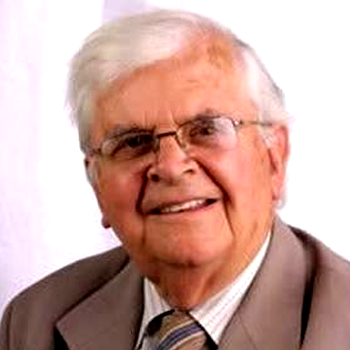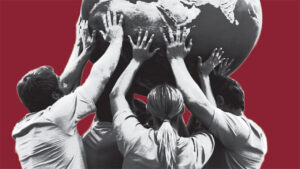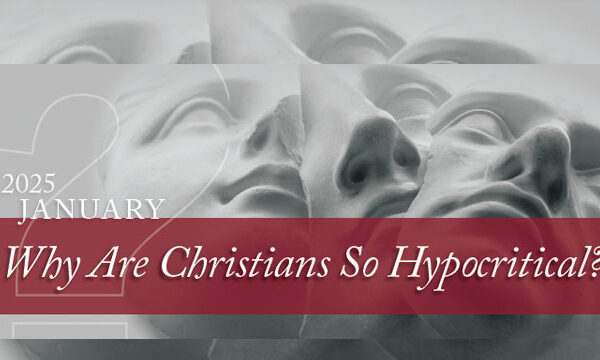Back to series



And What About the Future?
(originally titled "The Judgment of the Nations" (1971))
VOLUME 8 NUMBER 2 ISSUE OF BROADCAST TALKS (PDF)
BROADCAST TALKS presents ideas to cultivate Christ-like thinking and living. This special issue features a transcription of a talk at the Jerusalem Conference on Biblical Prophecy in June 1971 by James M. Houston, who would later become a cofounder of the C.S. Lewis Institute.
Introduction by Joel S. Woodruff
|
|||

James M. Houston
Professor, CSLI Co-Founder, Senior Fellow for Faith and Vocation, CSLI James M. Houston is a co-founder of the C.S. Lewis Institute. From its beginning, Jim has served as a Senior Fellow of the Institute, lecturing at CSLI events over the past four decades. He received his Bachelor of Science and M.A. degrees from the University of Edinburgh and a D. Phil. from Oxford University. He was a University Lecturer at Oxford from 1947 – 1971 where he taught cultural and historical geography. While teaching at Oxford, he met C.S. Lewis and participated in a regular Bible study with him for six years. He is known as one of the “founding fathers” of Regent College in Vancouver, British Columbia where he has served as the first Principal, Chancellor and Professor of Spiritual Theology.
 COPYRIGHT: This publication is published by C.S. Lewis Institute; 8001 Braddock Road, Suite 301; Springfield, VA 22151. Portions of the publication may be reproduced for noncommercial, local church or ministry use without prior permission. Electronic copies of the PDF files may be duplicated and transmitted via e-mail for personal and church use. Articles may not be modified without prior written permission of the Institute. For questions, contact the Institute: 703.914.5602 or email us.
COPYRIGHT: This publication is published by C.S. Lewis Institute; 8001 Braddock Road, Suite 301; Springfield, VA 22151. Portions of the publication may be reproduced for noncommercial, local church or ministry use without prior permission. Electronic copies of the PDF files may be duplicated and transmitted via e-mail for personal and church use. Articles may not be modified without prior written permission of the Institute. For questions, contact the Institute: 703.914.5602 or email us.
-
Recent Podcasts
From Anti-Christian to Pastor – Brian Smith’s Story
by Jana Harmon, Brian Smith on January 17, 2025Brian grew up in a small Georgia town...Read More
-
Time With God
by Aimee Riegert, J.I. Packer on January 10, 2025
-
Faith and Reason – Henare Whaanga’s Story
by Henare Whaanga, Jana Harmon on January 3, 2025
-
Recent Publications
Why Are Christians So Hypocritical?
by Christopher L. Reese on January 1, 2025Oh, the hypocrisy of those Christians—they talk so...Read More
-
How Artists and Their Art Can Point Us to the Creator
by Russ Ramsey on December 2, 2024
-
What about Jesus’s Childhood?
by Jim Phillips on December 1, 2024
0
All Booked
0.00
All Booked
0.00
All Booked
23931
GLOBAL EVENT: Sentenced to Death with Maryam Rostampour-Keller, 8:00PM ET
https://www.cslewisinstitute.org/?event=global-event-sentenced-to-death-with-maryam-rostampour-keller-800pm-et&event_date=2025-02-07®=1
https://www.paypal.com/cgi-bin/webscr
2025-02-07

Next coming event
Days
Hours
Minutes
Seconds
GLOBAL EVENT: Sentenced to Death with Maryam Rostampour-Keller, 8:00PM ET
On February 7, 2025 at 8:00 pmCategories
Speakers

James M. Houston
Professor, CSLI Co-Founder, Senior Fellow for Faith and Vocation, CSLI
Team Members

James M. Houston
Professor, CSLI Co-Founder, Senior Fellow for Faith and Vocation, CSLIJames M. Houston is a co-founder of the C.S. Lewis Institute. From its beginning, Jim has served as a Senior Fellow of the Institute, lecturing at CSLI events over the past four decades. He received his Bachelor of Science and M.A. degrees from the University of Edinburgh and a D. Phil. from Oxford University. He was a University Lecturer at Oxford from 1947 – 1971 where he taught cultural and historical geography. While teaching at Oxford, he met C.S. Lewis and participated in a regular Bible study with him for six years. He is known as one of the “founding fathers” of Regent College in Vancouver, British Columbia where he has served as the first Principal, Chancellor and Professor of Spiritual Theology.


 I must also confess that looking into the crystal ball has never been a hobby of mine. I have always felt that an exaggerated interest in the predictive element of prophecy often leads to unreliable, subjective views which, at their worst, tend to be schismatic, fanatic, sectarian, and even on the lunatic fringe. We suffer enough scorn, my brethren, from the world for being Christians, without suffering unnecessarily so from our own prophetic extravaganza. Rather, I find assurance that a great portion of biblical prophecy is concerned with forthtelling, with the unfolding of God’s judgment on the behavior of His creatures.
I must also confess that looking into the crystal ball has never been a hobby of mine. I have always felt that an exaggerated interest in the predictive element of prophecy often leads to unreliable, subjective views which, at their worst, tend to be schismatic, fanatic, sectarian, and even on the lunatic fringe. We suffer enough scorn, my brethren, from the world for being Christians, without suffering unnecessarily so from our own prophetic extravaganza. Rather, I find assurance that a great portion of biblical prophecy is concerned with forthtelling, with the unfolding of God’s judgment on the behavior of His creatures. Again, the apostle Paul, as did our Lord in the gospels, reveals how insidiously it all begins. Ungodliness is primarily an absence of reverence, and without reverence there can be no foundation for a lasting morality. But reverence is not a commodity we happen to possess or not; it is a personal attitude which must be cultivated toward each other and supremely so toward God. Irreverence thus springs from two sources: that which is rooted in pride, in self-autonomy, in the denial of God; and that which issues from concupiscence, that insisting on choosing only what is agreeable and pleasurable. Irreverence quickly leads to revolt, to rebellion against God and of our obligations to Him. Inevitably, revolt against God leads to the idolatrous worship of the other—whether it be Venus the purveyor of hedonism, Prometheus the promise of power, Sisyphus the nihilistic seeker of meaning, or other idols of the mind and the senses. Today, as men cry out that “God is dead,” we see in faith that the silence of God is also His wrath. It is in the manner of divine judgment among the nations that apparently God does nothing. He judged the builders of the Tower of Babel for their ungodliness, by their confusion. He judged the Graeco-Roman world by permitting it to collapse in its own rottenness. And in the irreverence and revolt of contemporary society, God is permitting the seeds of decay to bring forth their own fruit of alienation and despair.
Again, the apostle Paul, as did our Lord in the gospels, reveals how insidiously it all begins. Ungodliness is primarily an absence of reverence, and without reverence there can be no foundation for a lasting morality. But reverence is not a commodity we happen to possess or not; it is a personal attitude which must be cultivated toward each other and supremely so toward God. Irreverence thus springs from two sources: that which is rooted in pride, in self-autonomy, in the denial of God; and that which issues from concupiscence, that insisting on choosing only what is agreeable and pleasurable. Irreverence quickly leads to revolt, to rebellion against God and of our obligations to Him. Inevitably, revolt against God leads to the idolatrous worship of the other—whether it be Venus the purveyor of hedonism, Prometheus the promise of power, Sisyphus the nihilistic seeker of meaning, or other idols of the mind and the senses. Today, as men cry out that “God is dead,” we see in faith that the silence of God is also His wrath. It is in the manner of divine judgment among the nations that apparently God does nothing. He judged the builders of the Tower of Babel for their ungodliness, by their confusion. He judged the Graeco-Roman world by permitting it to collapse in its own rottenness. And in the irreverence and revolt of contemporary society, God is permitting the seeds of decay to bring forth their own fruit of alienation and despair. You may think this an exaggerated assessment of our times. Yet the well-known American economist, Kenneth E. Boulding, has said the same thing. “One notices in these days,” he said at the American Association for the Advancement of Science in 1969, “a tendency almost to deify technology, to regard it as a sentient agency in society, with a will of its own, imposing its own methods and mechanisms on at best a passive and at worst an unwilling mankind.” Perhaps in tracing trends in this “technolatry” we may reapply the relevance of Revelation 13 for our own times. With matchless vigor, events and traits of evil that repeat themselves in new forms are described. They have just the same outcome today as the apostle anticipated in his day, though we may believe they are uniquely powerful now.
You may think this an exaggerated assessment of our times. Yet the well-known American economist, Kenneth E. Boulding, has said the same thing. “One notices in these days,” he said at the American Association for the Advancement of Science in 1969, “a tendency almost to deify technology, to regard it as a sentient agency in society, with a will of its own, imposing its own methods and mechanisms on at best a passive and at worst an unwilling mankind.” Perhaps in tracing trends in this “technolatry” we may reapply the relevance of Revelation 13 for our own times. With matchless vigor, events and traits of evil that repeat themselves in new forms are described. They have just the same outcome today as the apostle anticipated in his day, though we may believe they are uniquely powerful now. The effects of propaganda in mass-mindedness are consequent, paradoxically, on the rise of individualism. And we are all aware of the association between the increase of money and the cult of individualism. This in turn is associated with a dissolution of basic groupings based on loyalty and reverence—the home and the family, the small social group, the church fellowship, etc. Envy and economics suck growing proportions of the world’s population into city life where economic and individualist values are at their most intensive state. Therein is the milieu, the vacuum of basic values for mass-mindedness. So that in the guise of apparent individualist freedom there is a totalitarian bondage of spirit to mass values and cultures. Authority is personalized, visibly displayed in the hopes that “public opinion” can be substituted for political or social moralities; hence “the star cultus” at all levels of society. It is within this atmosphere of expectancy that divus Caesar begins to loom large. For the enormous expansion of the centralized transfer of information reinforces the potentialities for centralized power.
The effects of propaganda in mass-mindedness are consequent, paradoxically, on the rise of individualism. And we are all aware of the association between the increase of money and the cult of individualism. This in turn is associated with a dissolution of basic groupings based on loyalty and reverence—the home and the family, the small social group, the church fellowship, etc. Envy and economics suck growing proportions of the world’s population into city life where economic and individualist values are at their most intensive state. Therein is the milieu, the vacuum of basic values for mass-mindedness. So that in the guise of apparent individualist freedom there is a totalitarian bondage of spirit to mass values and cultures. Authority is personalized, visibly displayed in the hopes that “public opinion” can be substituted for political or social moralities; hence “the star cultus” at all levels of society. It is within this atmosphere of expectancy that divus Caesar begins to loom large. For the enormous expansion of the centralized transfer of information reinforces the potentialities for centralized power.


